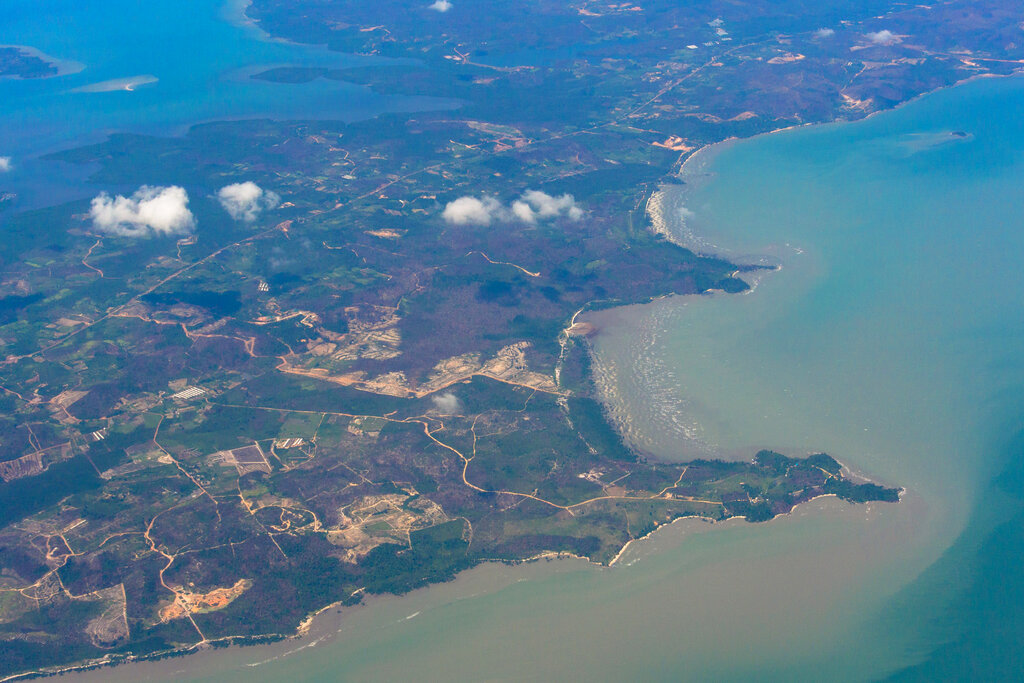
Tensions have been running high in the usually sleepy villages of Rempang island, as local residents struggle to defend their centuries-old villages from being torn down to make way for an ambitious Chinese-funded industrial and tourism hub.
On Monday, around 1,000 people gathered outside the BP Batam building, a government agency that manages construction and development in the region, to protest the eviction of residents for construction of Rempang Eco-City. The industrial park, which in July secured a $11.5 billion commitment from Chinese glass producer Xinyi Group for a quartz sand processing plant, has faced heated opposition from local residents—an estimated 7,500 are set to be displaced for the park’s construction.
As demonstrators threw bottles and rocks in front of the government building, police responded with water cannons and tear gas. Forty-three protesters were arrested, police said on Tuesday.
Last week, authorities similarly faced off with residents on the island when a land survey team arrived to measure the area for development. Dozens of students from a nearby middle school were taken to the hospital after being affected by tear gas fired by the police, the school principal told local media.
The confrontations highlight the mounting tensions between authorities and local communities across Indonesia over a range of infrastructural projects—many of which are funded by Chinese companies—that threaten to displace indigenous communities. As Indonesia aggressively courts Chinese investment for ambitious projects at home, observers say that these tensions are set to heighten.
More From TIME
In July, at a meeting with businessmen in China, Indonesian President Joko Widodo, commonly referred to as Jokowi, urged the potential investors to voice any concerns if they encounter difficulties with their projects in Indonesia. “I hope that if there are problems regarding either land acquisition or permits, please relay them,” he said.
“The two governments realize that there’s a lot of negative sentiments towards Chinese investments,” says Siwage Dharma Negara, a senior fellow at the ISEAS-Yusof Ishak Institute and a co-coordinator of its Indonesia studies program. According to a 2022 survey conducted by the institute of the Indonesian general public, 60% of respondents felt that China’s Belt and Road Initiative, the country’s flagship international infrastructure investment project, would “only create a financial debt trap for other countries, including Indonesia, to be heavily indebted to China.”
Read More: China Spent Years Lending to Low-Income Countries. That's Becoming a Problem
Similar apprehension is echoed across Southeast Asia, with 64.5% of respondents from another ISEAS-Yusof Ishak Institute survey this year saying that they are worried about China’s growing regional economic influence.
The souring sentiment towards Chinese-funded infrastructure projects in Indonesia comes amid a series of high-profile disappointments—most notably the Jakarta-Bandung High-Speed Railway, part of the Belt and Road Initiative. The railway, which delayed its launch in August, has been plagued by cost overruns and safety concerns. (Last week, however, Chinese Premier Li Qiang rode the train on a trial run and discussed a potential extension of the railway to the Indonesian city of Surabaya).
Indonesia is also trying to leverage its position as the world’s top nickel producer to become a global electric vehicle manufacturing hub—though this national EV push, which has also been propped up by Chinese investment, has come at the expense of serious environmental and health risks.
Still, despite criticisms of the environmental and social risks that these projects bring to local communities, authorities are keenly aware of the cascading economic benefits that Indonesia could reap from such investments. The Rempang Eco-City deal that was struck in July was estimated to create some 35,000 jobs in Indonesia.
In the wake of the violent protests over Rempang Eco-City, Riau Islands Governor Ansar Ahmad explicitly urged the public to maintain order to protect the investment climate. “This project has the potential to bring great benefits, boost economic growth, and improve the welfare of the people in the Riau Islands and throughout Indonesia,” he said in a statement on Tuesday.
Jokowi said on Tuesday that the conflict in Rempang was the result of a lack of communication between local authorities and residents. He also appointed the country’s investment minister to explain the project to Rempang residents, including the compensation they would get from the land acquisition.
Read More: Here’s Why Bali Plans to Start Charging a Tourist Tax
Meanwhile, the recent arrests have sent fresh fears rippling through the local community, as police continue to hunt down suspects in the Rempang riots.
In a statement to TIME, BP Batam said that “it is common when there is a development in the region where local community involved, there will be resistance. However, we will work with all related institutions to proceed with the development with optimal personal and institutional approach.”
“I think the way they approached it was too fast, which is the style of Jokowi,” says Siwage. “[He] always wants everything to be quick, but the problem with that is sometimes you miss the first steps that are important to get support from the community and other stakeholders.”
More Must-Reads from TIME
- Inside Elon Musk’s War on Washington
- Meet the 2025 Women of the Year
- The Harsh Truth About Disability Inclusion
- Why Do More Young Adults Have Cancer?
- Colman Domingo Leads With Radical Love
- How to Get Better at Doing Things Alone
- Cecily Strong on Goober the Clown
- Column: The Rise of America’s Broligarchy
Contact us at letters@time.com